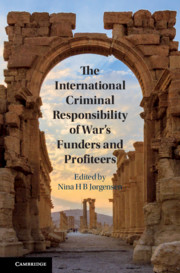Book contents
- The International Criminal Responsibility of War’s Funders and Profiteers
- The International Criminal Responsibility of War’s Funders and Profiteers
- Copyright page
- Contents
- Illustrations
- Contributors
- Acknowledgements
- Abbreviations
- Introduction
- Part I Financiers and Profiteers after World War II
- Part II Arms Fairs and ‘Flying Money’
- Part III Developing the Available Law
- 7 The Prohibition of Pillage in International Humanitarian Law
- 8 A Jurisprudential History of the Displacement Crimes Applicable to Corporate Landgrabbing
- 9 The International Responsibility of War Profiteers for Trafficking in Persons
- Part IV Where Should the Buck Stop?
- Part V Criminal Accountability and Beyond
- Part VI Discovering and Recovering the Profits of War
- Index
8 - A Jurisprudential History of the Displacement Crimes Applicable to Corporate Landgrabbing
from Part III - Developing the Available Law
Published online by Cambridge University Press: 18 September 2020
- The International Criminal Responsibility of War’s Funders and Profiteers
- The International Criminal Responsibility of War’s Funders and Profiteers
- Copyright page
- Contents
- Illustrations
- Contributors
- Acknowledgements
- Abbreviations
- Introduction
- Part I Financiers and Profiteers after World War II
- Part II Arms Fairs and ‘Flying Money’
- Part III Developing the Available Law
- 7 The Prohibition of Pillage in International Humanitarian Law
- 8 A Jurisprudential History of the Displacement Crimes Applicable to Corporate Landgrabbing
- 9 The International Responsibility of War Profiteers for Trafficking in Persons
- Part IV Where Should the Buck Stop?
- Part V Criminal Accountability and Beyond
- Part VI Discovering and Recovering the Profits of War
- Index
Summary
This chapter discusses the crime of deportation, casting is as a legal history that will inform upcoming land grabbing cases against businesses, for example before the International Criminal Court. The term ‘land grabbing’ denotes the illegal forcible eviction of local populations in order to make way for mining, logging, agricultural plantations, infrastructure projects, and other commercial ventures. The phenomenon is a widespread and rapidly growing problem globally, often involving the collusion of political leaders, local businesspeople, representatives of multinational enterprises and financial institutions. There is a growing interest in employing international criminal justice as a response to these practices, but land grabbing itself is not an international crime, meaning that prosecutors would likely seek to charge displacement-type offenses for corporate implication in these practices. Therefore, a jurisprudential history of displacement crimes in international criminal law is an important point of departure in assessing the potential and pitfalls of the new weight to be placed on these crimes, either as a basis for expanding international courts’ jurisdiction over atrocities or for addressing some of the underling commercial interests that provide both the means and motivation for them.
Keywords
- Type
- Chapter
- Information
- Publisher: Cambridge University PressPrint publication year: 2020

